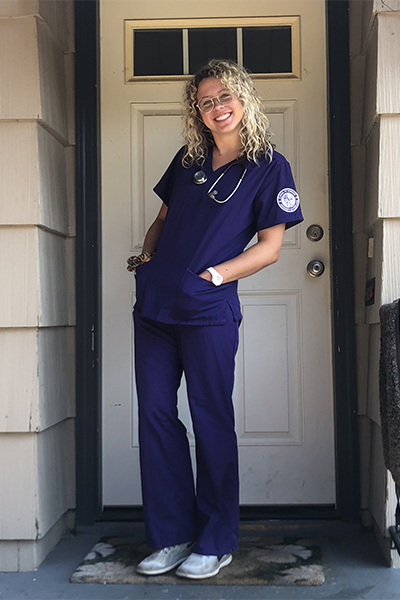
Portland Magazine
Nursing
March 20, 2020
 Eileen Ryan ’21 is a junior nursing major who has been completing her community health rotations by serving at Kenton Women’s Village in North Portland. The village is made up of 14 sleeping pods designed and built in late 2016 as part of the POD (Partners on Dwelling) Initiative, which brought together a citywide coalition of architects, housing advocates, and houseless individuals.
Eileen Ryan ’21 is a junior nursing major who has been completing her community health rotations by serving at Kenton Women’s Village in North Portland. The village is made up of 14 sleeping pods designed and built in late 2016 as part of the POD (Partners on Dwelling) Initiative, which brought together a citywide coalition of architects, housing advocates, and houseless individuals.
Administered by Catholic Charities of Oregon, KWV assists formerly houseless women to access services, including case management, employment assistance, access to legal and financial services, and mental and physical health care. KWV also supports the creation and implementation of a personalized plan to transition to permanent housing by the time an individual leaves the village.
This is a clinical rotation in Community Health, which is the focus of the entire semester. We’ve been placed in clinical sites around Portland that have to do with the community, so none of them are in hospitals or acute care settings. We’re in senior citizen homes, food banks, and I got placed at Kenton Women’s Village.
My clinical partner and I go every Thursday from about 8:30 a.m. to 3 or 4 in the afternoon. We have a full day. Within the village we have a specific pod, just for us. We counsel women in whatever they want to talk to us about. We do a lot of education; we’re currently working on poster boards on topics the women want to learn about, like diabetes, smoking cessation, nutrition, things like that, and we try to get everybody to be as active as they can. If somebody has an infection, we can definitely assess them for it. We can’t provide antibiotics, but we can tell them which clinics to go to, and we can educate them about what their insurance covers. We can dress wounds, we can take blood pressure, we can do vitals. It’s mostly education we have to offer—helping with preventative measures.
Our clients are all on a pretty similar income level. Some of them are coming off the streets; some are living in their cars. They all share an incredible measure of resilience and have all been through so much. They’re all very willing to change their situation, and living in the village is a really good way to do that. Usually the women coming in have been through a lot of different housing situations and are really just looking for a safe place to stay. There’s a long wait list. It takes a long time to get in because the demand is so high.
I think that I got very lucky in being at this place and working with this population because I’m personally really interested in women’s health, especially for lower-income women. I’m learning a lot of valuable ways to talk about very difficult subjects that I wouldn’t necessarily be talking about with different groups. I think it’s good that we’re doing this community health rotation first because now I know how to gently broach very sensitive subjects.
I don’t know for sure yet, since we haven’t done a lot of other rotations. I really do like community health. I like meeting women and talking about their goals and seeing them reach those goals or not, and then kind of changing the plan to help them get there. I haven’t worked in a hospital yet, so I can’t say which one I would choose at this point.
This is definitely more people-focused, not skills-focused, which I think is a good gateway. I’d rather know how to talk with people before doing other skills.
University of Portland
5000 N. Willamette Blvd.,
Portland, Oregon 97203-5798
503.943.8000
This website uses cookies to track information for analytics purposes. You can view the full University of Portland privacy policy for more information.
